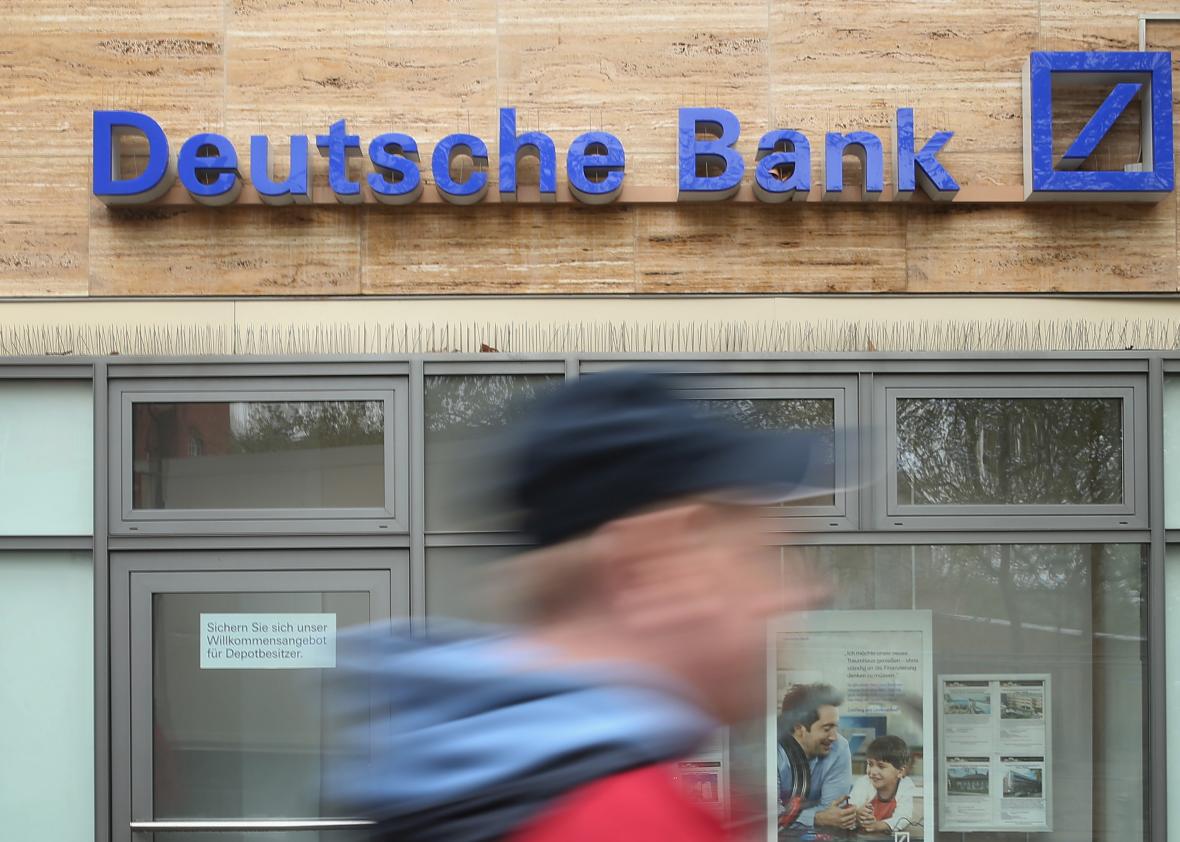It’s never a good look when a major bank has to pipe up and reassure the world that it’s still financially sound. But such is the lot this week of Deutsche Bank, which has been getting absolutely savaged by the markets as of late. Its shares, down more than 40 percent this year on the New York Stock Exchange, are trading at a record low, while the cost of insuring its debt has spiked, a sign investors are becoming more worried that it might default. The beating has been so bad that CEO John Cryan felt compelled to send his employees an upbeat memo on Tuesday promising them that the bank “remains absolutely rock solid.”
Its stock kept tumbling.
The ups and downs of Teutonic high finance might not seem like a super pressing concern here in the United States, where Donald Trump might still be on the verge of turning the presidential election into a full-on Idiocracy prequel. But given the fragile state of global markets, it’s possible that any trouble at Germany’s largest bank could spread.
What’s wrong with Deutsche Bank? In part, it’s dealing with the same problems facing banks all across Europe. The combination of sagging global growth and low interest rates has made it difficult to earn money from lending. Loans to energy companies are going bust. Stricter rules designed to make the financial system more stable have made investment banking less lucrative, leading some institutions to shrink that line of business. This has all culminated in a “chronic profitability crisis” among Europe’s banks, as the Wall Street Journal puts it.
Things have been especially ugly for Deutsche Bank, though, because of its legal rap sheet. Last month, Frankfurt’s finest announced a prodigious 6.7 billion euro annual loss, thanks in large part to the billions of dollars it has had to set aside to pay fines and settle litigation involving all manner of fraud and international sanctions violations. With more law-enforcement trouble potentially looming, investors are worried that Deutsche Bank is one big, unforeseen financial penalty away from serious trouble. Forget turning a profit—the bank might have to stiff some of its bondholders.
Understanding why requires a little bit of background. In order to prepare for new international requirements set under the Basel III agreement, banks have been trying to build up their capital bases—the financial safety cushions that are supposed to buffer them from losses on riskier assets. One can spend many deeply dull hours learning the ins and outs of what does and doesn’t count as bank capital. But to simplify, “tier 1” capital, the type that’s relevant to Deutsche Bank’s predicament, is basically money that a financial institution doesn’t have to pay back to a lender. That typically includes funds raised by issuing stock, or retained profits.
But in Europe banks have also been fattening up their capital ratios by selling large quantities of so-called contingent convertible bonds, or CoCo Bonds, which Bloomberg has described as “high-yield hand grenades.” These securities are a sort of cross between a stock and a bond. Like a regular bond, they pay interest. But banks can choose to skip payments if need be. And should their capital levels fall too low, the bank can convert them into stock or, in many cases, simply write off the debt.
Investors have gone cuckoo for CoCo bonds—sorry, I’m so sorry—in part because they offered fairly high interest rates, which have been hard to come by in recent years, but also because they were pretty sure banks would treat them as normal debt. Now that seems like less of a sure bet. This week, CreditSights analyst Simon Adamson warned that Deutsche Bank might have to miss coupon payments by next year. “While we are confident about 2016 coupons, we are less so about coupon payments in 2017,” he wrote. The bank has tried to reassure CoCo bondholders that in fact it has all the money it needs to keep paying them, but credit markets still went into a tizzy.The anxiety has been fueled, in part, by Deutsche Bank’s precarious legal situation since, again, one big settlement could change its entire financial standing. In a worst-case scenario, the bank could theoretically have to force losses on bondholders by swapping their CoCos for stock or wiping away the debt entirely.
Is that really something to lose sleep over? Maybe. “When the first one goes sour and halts coupon payments, it’s possible investors could suddenly wake up to the inherent risk and flee all CoCos, destabilizing the corporate bond market and possibly even the financial system,” Bloomberg opines. At the very least, it’s one more potential source of instability at a moment when markets are already full of them. So much for German reliability.
Update, Feb. 10, 2016, at 8:40 a.m.: Deutsche Bank’s stock jumped in Frankfurt on Wednesday after the Financial Times reported that it was considering buying back billions of euros worth of bonds as a show of financial strength. Repurchasing debts that have fallen below their face value could also help the bank book a profit. Notably, the program would not include the CoCo bonds that have had investors worried
